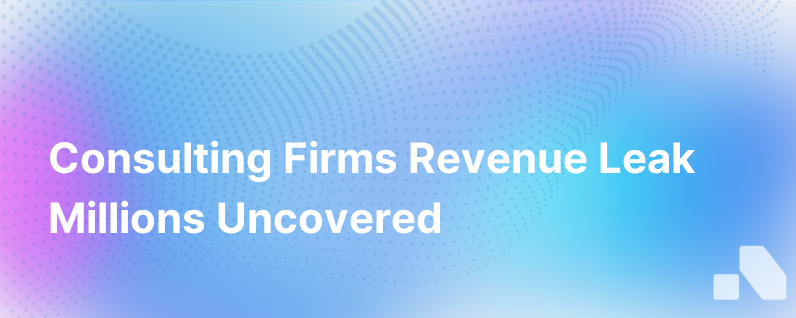
The consulting industry is a dynamic and competitive field characterized by its ability to adapt to change and anticipate market demands. Yet, despite the strategic prowess consulting firms display, they are not immune to systemic challenges. One such pressing issue is revenue leakage, where potentially tens of millions of dollars are lost silently without firms even realizing the magnitude of their losses. This leakage could be likened to a crack in a dam; seemingly insignificant at first but with potential to cause disastrous losses if not addressed.
Understanding Revenue Leakage
Revenue leakage in the consulting sector can be insidious and difficult to detect. It refers to the unintended loss of revenue due to inefficiencies or errors in business processes, pricing discrepancies, non-billable work, or poorly managed contracts.
This leakage often occurs over time and can go unnoticed due to its gradual nature. It can stem from a variety of sources, such as:
-
Inaccurate Time Tracking: If consultants do not accurately record their billable hours, firms cannot charge their clients appropriately.
-
Scope Creep: Without stringent project management and client expectations, projects can expand beyond their initial scope without corresponding increases in billing.
-
Underpricing Services: Undervaluing services due to poor market analysis or competitive pressures can lead to significant revenue shortfalls.
-
Contract Non-compliance: Failure to deliver on contracted terms or overlooking renewals can lead to penalties or missed revenue opportunities.
-
Inefficient Resource Allocation: Assigning too many resources to a project or the wrong skill set leading to over-servicing or undercharging.
The Impact of Revenue Leakage
The impact of revenue leakage can be profound, affecting various facets of a consulting firm's operations:
-
Profit Erosion: Even small inefficiencies, when multiplied across numerous clients and projects, can result in a substantial dip in profitability.
-
Operational Inefficiency: Revenue leakage often signals underlying inefficiencies within the firm’s processes that need addressing.
-
Competitive Disadvantage: Firms that fail to plug revenue leaks may find themselves at a financial disadvantage compared to their more efficient competitors.
-
Client Relationships: Over time, inaccuracies in billing or discrepancies in service delivery can strain client relationships.
Detecting and Preventing Revenue Leakage
Detecting and preventing revenue leakage necessitates a comprehensive strategy that involves:
1. Robust Process Management: Review and streamline end-to-end processes from business development, through to delivery, and invoicing to minimize manual errors and operational bottlenecks.
2. Accurate Time Tracking: Implement and enforce meticulous time-tracking policies to ensure that all billable work is accurately recorded and invoiced.
3. Scrupulous Contract Management: Monitor contracts diligently for compliance, renewal dates and scope changes, deploying contract management systems if necessary.
4. Strategic Pricing Models: Develop pricing strategies based on detailed market analysis and the true value delivered to clients, rather than cost-plus or competitive benchmarking alone.
5. Enhanced Resource Planning: Utilize sophisticated resource planning tools to match the right consultant with the appropriate project, ensuring efficient use of skills and expertise.
6. Data-Driven Decision Making: Leverage analytics and business intelligence tools to gain insight into operational metrics that help identify and close revenue gaps.
7. Regular Audits: Conduct regular financial and operational audits to catch discrepancies or inefficiencies early on.
8. Technology Integration: Employ advanced tools like AI and machine learning to automate processes and detect patterns indicative of revenue leakage.
The Role of Technology in Plugging Revenue Leaks
In this context, technology and AI offer transformative potential. Modern intelligent systems, like Aomni, can play a pivotal role in diagnosing and repairing the root causes of revenue leakage for consulting firms. These platforms enable real-time account research, delivering competitive insights, and personalizing content strategies. With these tools, firms can effectively address revenue leak points with a minimal manual overhead.
Consider the following applications:
A. Automating Time Tracking: AI can automatically generate time entries based on project engagements, email correspondence, and meetings.
B. Predictive Analytics: By analyzing historical data, AI can predict and alert management of potential scope creeps or contract non-compliance issues.
C. Enhanced Decision-Making: AI platforms can provide data-driven recommendations on pricing, resource allocation or project management tailored to the current market conditions.
D. Contract Management: AI can proactively monitor contract terms, ensuring that all deliverables are met and all billable items are accounted for.
Conclusion
The issue of revenue leakage undeniably represents a significant obstacle for consulting firms aiming to maintain or improve their market positions. Systemic concerns require a strategic and technologically enhanced approach to identify, halt, and reverse the factors leading to these leaks.
The disruptive potential of AI platforms, such as Aomni, cannot be overstated in the context of revenue optimization. As firms become more data-oriented, they gain access to unprecedented analytical firepower, laying the groundwork for sustained financial improvement and operational excellence.
In a competitive environment where every dollar counts, addressing revenue leakage isn't just about reclaiming lost revenue; it's about securing the future profitability and viability of consulting practices. Firms that adopt a proactive stance on revenue leakage will fortify their revenue streams and safeguard their positions in an ever-evolving marketplace.